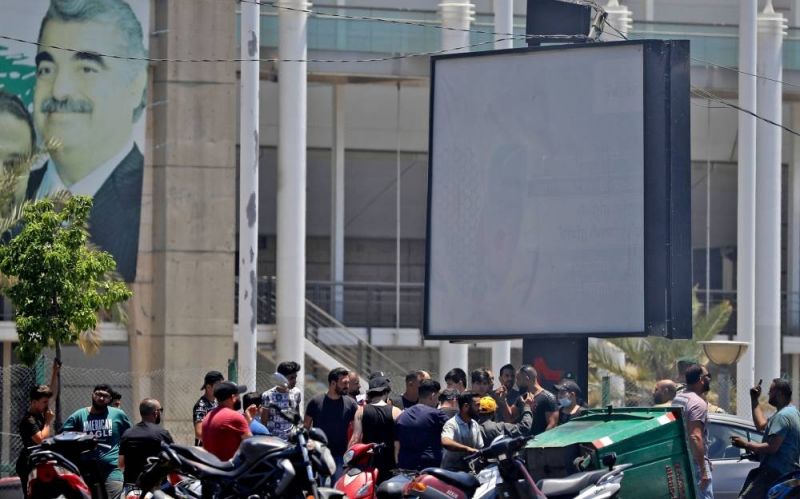
Lebanese demonstrators blocked streets in Beirut on Thursday to protest the deteriorating economic situation in the country. (Credit: Joseph Eid/AFP)
BEIRUT — Government offices, banks and businesses across the country shuttered their doors Thursday, partaking in a general strike in protest of the ongoing government formation deadlock and the deteriorating economic situation in the country. Several political parties even joined the strike, drawing a raft of caustic commentary on social media from residents and activists who view these parties as responsible for the very predicament they are protesting.
Businesses in the private and public sectors remained shut across Lebanon’s major cities, including Beirut, Nabatieh, Hermel and Jezzine, local media outlets reported. In the capital, dozens of demonstrators and union leaders and members gathered in front of the Labor Union headquarters in Beirut, demanding the formation of a government.
Thursday’s strike was called by the General Confederation of Lebanese Workers (CGTL), an umbrella organization that includes over 40 unions and labor federations and which is widely viewed as having been largely co-opted by authorities since the 1990s as a means to neutralize and control the union movement.
In a speech at the Labor Union headquarters, CGTL head Bechara al-Asmar called on politicians to stop their political bickering and form a government, but then also thanked “all the political parties who took part in the strike today.”
Groups from the Free Patriotic Movement — Lebanon’s largest Christian party — and Prime Minister-designate Saad Hariri’s Sunni Future Movement had on Wednesday said they would back the strike and called on their supporters to participate. Parliament Speaker Nabih Berri’s Amal Movement also took part in the strike.
The Association of Banks in Lebanon, a consistent target of protesters’ ire over the last year as informal capital controls imposed by the country’s commercial banks amid the country’s economic collapse limit depositors’ access to their savings, also announced on Tuesday that it would close its doors.
The participation of the political elite and the banking sector in the general strike drew widespread ridicule. Lebanon’s residents and activists took to social media to mock the spectacle using the hashtag “the ruling class revolts.”
“Anti-government protests the Lebanese way … Because everyone has the right to protest, even the government,” tweeted political economist Marina Chamma.
“They stole everything from us … even our revolution,” another Twitter user, Charbel Rustom, wrote.
Doctored images and memes of politicians being dragged away by security forces at protests circulated on Twitter and Instagram. One image superimposed the heads of President Michel Aoun, Hariri and Berri onto demonstrators engaging in the common protest practice of creating a roadblock by setting tires alight.
Labor movements researcher and co-host of The Lebanese Politics Podcast Nizar Hassan described the strike as a theatrical display by politicians like Hariri and Berri, who are currently attempting to put pressure on opposing political parties to form a cabinet.
“It’s a theatrical thing and they’re talking about government formation because this is now the demand of Hariri and Berri,” Hassan told L’Orient Today.
“I’m sure there are some people with good intentions but this strike was not the result of any organic mobilization of workers,” Hassan said.
However, demonstrators in front of the Labour Union headquarters in Beirut said they were not overly concerned with who or what groups were supporting the general strike, with many dismissing the involvement of political parties.
Sitting in the middle of the road, blocking traffic with fellow demonstrators, 33-year-old Mohammed Hmayed said his salary was no longer worth anything due to the depreciation of the national currency, which has lost over 90 percent of its value since mid-2019.
“I don’t care who is supporting this, we’re here to demand that the government is formed in the fastest way possible so we can live,” said Hmayed, an employee at the telecommunications company Ogero.
"We want people to come down to the streets with us. We should not normalize the situation we are in,” he added.
Another demonstrator, Kamal Yatim, 63, would not comment on whether it bothered him that political parties were involved in the strike.
“Our only concern is to form the government to find a solution to the economic crisis and the deteriorating living situation,” Yatim said.
The strike comes against the backdrop of a public spat between Aoun and Berri. The latter has been leading an initiative to break the monthslong government formation deadlock. Lebanon has been without an empowered cabinet for more than 10 months, leaving the country largely rudderless amid the worst economic crisis it has witnessed since the 1975–90 Civil War.
Berri released a statement on Wednesday criticizing Aoun’s rejection of Hariri’s designation as prime minister and stressing that the president had no right to do so. Berri said that Hariri had been appointed to form the new government by the decision of legislative authority and criticized Aoun’s role in hampering cabinet formation efforts. Aoun later rebuffed the accusation in a statement, saying he was “seeking with all his might a solution to the governmental crisis.”